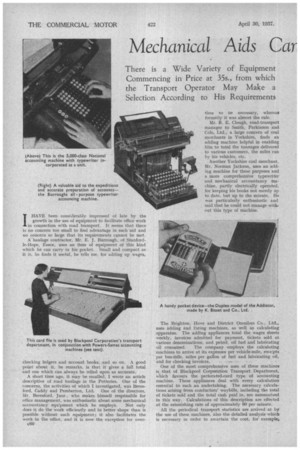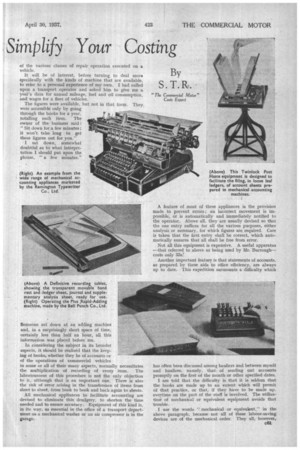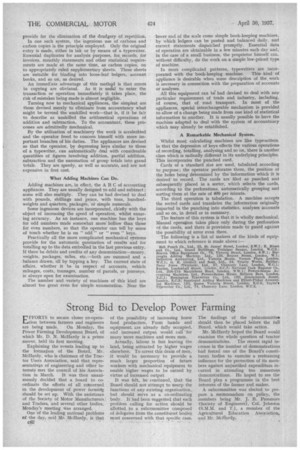Mechanical Aids Car Simplify Your Costing
Page 118

Page 119

Page 120

If you've noticed an error in this article please click here to report it so we can fix it.
There is a Wide Variety of Equipment Commencing in Price at 35s., from which the Transport Operator May Make. a Selection According to His Requirements
By S T. R.
IHAVE been considerably. impressed of late by the growth in the use of equipment to facilitate office work in connection with road transport. It seems that there is no concern too small to find advantage in such aid and no concern so large that its requirements cannot be met.
A haulage contractor, Mr. E. J. Burrough, of Stanfordle-Hope. Essex, uses an item of equipment of this kind which he can carry in his pocket. Small and compact as it is, he finds it useful, he tells me, for adding up wages, checking ledgers and account books, and so on. A good point about it, he remarks, is that it gives a full total and one which can always be relied upon as accurate.
A short time ago, it may be recalled, I wrote an article descriptive of road haulage in the Potteries. One of the concerns, the activities of which I investigated, was Beresford, CaddY and Pemberton, Ltd. One of the directors, Mr. Beresforcl, Jour., who makes himself responsible for office management, was enthusiastic about some mechanical accountancy equipment which he employs. Not only does it do the work efficiently and in better shape than is possible without such equipment; it also facilitates the work in the office, and it is now the exception for over
(760 tine to he necessary, whereas formerly it was almost the rule.
Mr. H. E. Clough, road-transport manager to Smith, Parkinson and Cole, Ltd., a large concern of coal merchants in Yorkshire, finds an adding machine helpful in enabling him to total the tonnages delivered to various customers, the miles run by his vehicles, etc.
Another Yorkshire coal merchant, Mr. Norman Jackson, uses an adding machine for these purposes and a more comprehensive typewriter and mechanical accountancy machine, partly electrically operated. for keeping his books not merely up to date, but up to the minute. He was particularly enthusiastic and said that he could not manage without this type of machine.
The Brighton, Hove and District Omnibus Co., Ltd., uses adding and listing machines, as well as calculating apparatus. The adding appliances total the wages sheets weekly, invoices admitted for payment, tickets sold at various denominations, and petrol, oil fuel and lubricating oil consumed. The company employs the calculating machines to arrive at its expenses per vehicle-mile, receipts per bus-mile. miles per gallon of fuel and lubricating oil, and for checking invoices..
One of the most comprehensive uses of these machines is that of Blackpool Corporation Transport Department, Which favours the perforated-card type of accounting machine. These appliances deal with every calculation essential to such an undertaking. The necessary calculations arising from conductors' waybills, including the total of tickets sold and the total cash paid in, are summarized in this way. Calculations of this description are effected at the astonishing rate of approximately 80 per minute.
All the periodical transport statistics are arrived at by the use of these machines, also the detailed analysis which is necessary in order to ascertain the cost, for example.i
of the various classes of repair operation executed on a vehicle.
It will be of interest, Wore turning to deal more specifically with the kinds of machine that are available, to refer to a personal experience of my own. I had called upon a transport operator and asked him to give me a yeai's data for annual mileage, fuel and oil consumption, and wages for a fleet of vehicles.
The figures were available, but not in that form. They, were accessible only by going through the books for a year, totalling each item. The owner of the business said: "Sit down for a few minutes ; it won't take long to get these figures out for you."
I sat down, somewhat doubtful as to what interpretation I should put upon the phrase, "a few minutes.
Someone sat down at an adding machine and, in a surprisingly short space of time, certainly less than half an hour, all this information was placed before me.
in considering the subject in its broader aspects, it should be realized that the keeping of books, whether they be of accounts or of the operations of commercial vehicles in some or all of their many aspects, normally necessitates the multiplication of recording of every item. The laboriousness of this procedure is not the only objection to it, although that is an important one. There is also the risk of error arising in the transference of items from sheet to sheet, from book to book and back again to sheets.
All mechanical appliances to facilitate accounting are devised to eliminate this drudgery, to shorten the time needed and to ensure accuracy. Equipment of this kind is, in its way, as essential in the office of a transport department as a mechanical washer or an air compressor is in the garage.
A feature of most of these .appliances is the provision made to prevent errors; an incorrect movement is possible, or is automatically and immediately notified to the operator. Above all, they are usually devised so that the one entry suffices for all the various purposes, either analysis or summary, for which figures are required. Care is taken that the first entry shall be correct, which automatically ensures that all shall be free from error.
Not all this equipment is expensive. A useful apparatus —that referred to above as being used by Mr. Burroughcosts only 35s: Another important feature is that statements of accounts, as prepared by these aids to office efficiency, are always up to date. This expedition surmounts a difficulty which
has often been discussed among hauliers and between myself and hauliers; namely, that of sending out accounts promptly on the first of the month or other specified dates.
I am told that the difficulty is that it is seldom that the books are made up to an extent which will permit of that practice, or that, if they have to be made up, overtime on the part of the staff is involved. The utilizatioit of mechanical or equivalent equipment avoids that trouble.
I use the words " mechanical or equivalent," in the above paragraph, because not all of these. labour-saving devices are of the mechanical order. They all, however, provide for the elimination of the drudgery of repetition.
In one such system, the ingenious use of carbons and carbon copies is the principle employed. Only the original entry is made, either in ink or by means of a typewriter. Essential duplicates for analysis purposes, for records, for invoices, monthly statements and other statistical requirements are made at the same time, as carbon copies, on to appropriately ruled supplementary sheets. These sheets are suitable for binding into loose-leaf ledgers, account books, and so on, as desired.
An immediate advantage of this methyl is that errors in copying are obviated. As it is ustfal to enter the transaction or operation immediately it takes place, the risk of mistakes being made is almost negligible.
Turning now to mechanical appliances, the simplest are those devised merely to eliminate from accountancy what might be termed the unskilled work—that is, if it be fair to describe as unskilled the arithmetical operations of addition and subtraction. To the accountant, these processes are admittedly mechanical.
By the utilization of machinery the work is accelerated and the operator freed to concern himself with more important branches of his duties. The appliances are devised so that the operator, by depressing keys similar to those of a typewriter, can automatically deal with considerable quantities of figures involving addition, partial addition, subtraction and the summation of group totals into grand totals. They are speedy, as well as accurate, and are not expensive in first cost.
What Adding Machines Can Do.
Adding machines are, in effect, the A B C of accounting appliances. They are usually designed to add and subtract ; some will also multiply. They can be had devised to deal with pounds, shillings and pence, with tons, hundredweights and quarters, packages, or simple numerals.
Some ingenious devices are incorporated, chiefly with the object of increasing the speed of operation, whilst ensuring accuracy. As an instance, one machine has the keys for odd numbers made somewhat more hollow than those for even numbers, so that the operator can tell by sense of touch whether he is on " odd " or " even " keys.
Practically all the more complicated mechanical systems provide for the automatic summation of results and for totalling up to the data embodied in the last previous entry. If there be debits and credits of any denomination—money, weights, packages, miles, etc.—both are summed and a balance drawn, all by tapping a key. The current state of affairs, whether it be in respect of accounts, vehicle mileages, costs, tonnages, number of parcels, or journeys, is always open for examivation.
The number and variety of machines of this kind are almost too great even for simple enumeration. Near the 'lower end of the scale come simple book-keeping machines, by which ledgers can be posted and balanced daily, and correct statements dispatched promptly. Essential data of operation are obtainable in a few minutes each day and, in the. case of a small business, the proprietor himself can, without difficulty, do the work on a simple low-priced type of machine.
In more complicated patterns, typewriters are incorporated with the book-keeping machine. This kind of appliance is desirable when some description of the, work is necessary in connection with the preparation of accounts or analyses. All this equipment can be had devised to deal with any particular requirement of trade and industry, including, of course, that of road transport. In most of the appliances, special interchangeable mechanism is provided to allow of a change being made from one kind of statistical information to another. It is usually possible to have the machine adapted to deal with the system of accountancy which may already be established.
A Remarkable Mechanical System.
Whilst most calculating machines are like typewriters, in that the depression of keys effects the various operations of recording, totalling, analysing and so on, there is another class which is radically different in its underlying principles. This incorporates the punched card. Cards of a standard size are used, tabulated according to purpose ; the operator perforates them, the position of the holes being determined by the information which it is desired to record. The cards are filed as punched and subsequently placed in a sorter, which selects the cards, according to the perforations, automatically grouping and sorting them at the rate of 400 per minute. The third operation is tabulation. A machine accepts the sorted cards and translates the information originally imparted in the punching into statistics, analyses accounts and so on, in detail or in sernmary.
The feature of this system is that it is wholly mechanical. Manual operation takes place only during the perforation of the cards, and there is provision made to guard against the possibility of error even there. The following is a list of makers of the kinds of equipment to which reference is made above :—
Bell Panels Co.„ Ltd, 35, St. James' Street, London, S.W.1.: K. Bisset and Co., Ltd., Grand Buildings, Trafalgar Fatinare London, W.C.2.; Bravon Office, Equipment Go., 76, Victoria Street, laindon, S.W.1; Burroughs Adding Machine, Ltd., 136. Regent Street, London, W.1; Definitive Accounting, Ltd., Victoria House, Vernon Place, London, W.C.1; G. H. Gledisill and Sons, Ltd., 54, Trinity Works, Halifax; Percy Jones (Twinck), Ltd., 37, Chancery Lane, London, W.C.1; Kardex, Leadenhall Street, London, E.C.3; National Casts Register Co., Ltd., 206-216 Marylehono Road, London, N.W.1; Powers-Barnes Accounting Machines, Ltd., Powers-Samas Howe, Rolbarn Bars, London, E.0.1; Remington Typewriter Co., Ltd.. 100, Gracechnrch Street, London, E.C.3; Sunstrand Adding :Machines and Elliott-Fisher Accounting Machines, 120, Queen Victoria Street, London, E.0.4; Taylor's Typewriter Co., Ltd., 74, Chancery Lane, London, W.C.2.








































































































































































